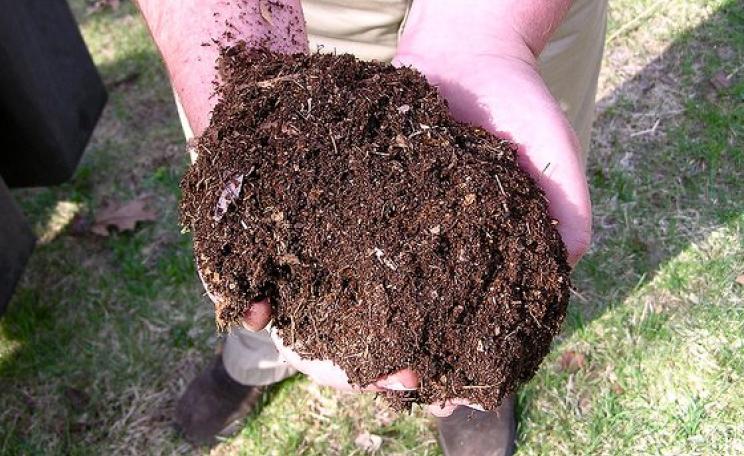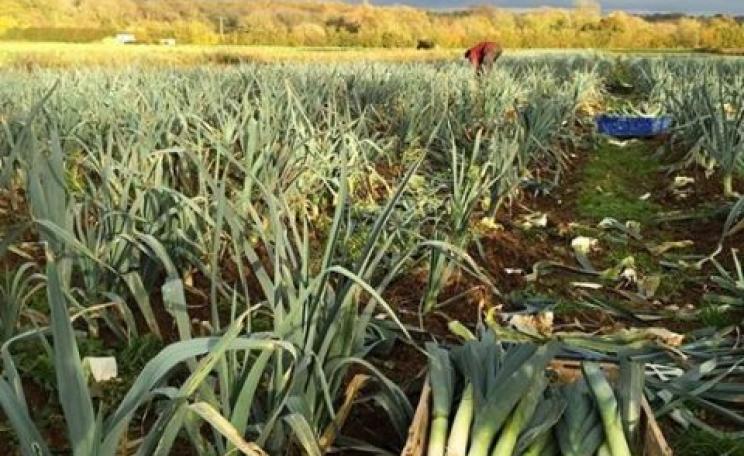Catering Mark's slogan 'Fresh food you can trust' is almost identical to the organic slogan 'Food you can trust'. In fact, 'Fresh food you can trust' sounds infinitely preferable - when in fact, it's the other way round.
Public catering has been a national disgrace for decades. In finally waking up to the obesity crisis, the government is now on a mission to improve the quality of the food we are served by the catering industry.
And it proudly cites the Soil Association's successful Catering Mark - whose reassuring slogan is "Fresh food you can trust" - as the benchmark for others to aspire to.
On paper, the Catering Mark's aims are entirely worthwhile, and seem like the virtuous answer to a prayer. Peter Melchett, Policy Director of the Soil Association, for example, proudly states that it "guarantees high standards".
And Helen Browning, CEO of the Soil Association, wrote in The Ecologist recently, that through the Catering Mark "everyday hundreds of thousands of people in nurseries, schools, workplaces, hospitals and care homes people now eat fresh, healthy and locally sourced meals."
A chorus of prominent figures and celebs has also praised it, including the Minister of Education. Nor is there any doubting its success. The Soil Association's press release celebrating the landmark million meals a day sums up its aim and achievements like this:
"The Catering Mark independently certifies food to ensure it meets high standards of provenance, freshness and quality and that British, local, sustainable and higher welfare products are used."
So far, so great. But is it? Catering Mark standards reveal the Catering Mark is not always what it seems, nor, despite it's tried and trusted pedigree, does it deliver what it says on the tin. As the public indirectly are mainly funding it, via public procurement contracts, a closer look would seem prudent.
The Catering Mark - how it works
The Catering Mark is the catering offshoot of the lottery-funded Food For Life Partnership (FFLP) programme.
Whereas the latter aims to improve school meals, and school children's understanding about where food comes from and how to cook it, the Catering Mark focuses specifically on improving catering standards, and has expanded into all areas of public and private catering
Based on a self-assessment form, verified by a Soil Association inspection, the Catering Mark has 3 'awards' - bronze, silver and gold - designed to recognise and reward caterers that are making a progression towards all the desirable goals mentioned above.
Bronze standards are mandatory, silver and gold have an additional points system which the caterers tot up themselves and submit - though in reality, apart from a requirement for a small amount of organic food, the difference between the three levels is not remarkably small.
Catering Mark's slogan 'Fresh food you can trust' is almost identical to the organic slogan 'Food you can trust'. In fact, 'Fresh food you can trust' sounds infinitely preferable - when in fact, it's the other way round.
So where the 'bronze' level does secure some worthwhile consumer gains, like the exclusion of industrial trans fats, undesirable additives including many food colourings, and eggs from caged hens, the extra effort needed to 'hit gold' is surprisingly small - and then there's nowhere else to go.
And while the flexible points system is great for caterers, it also means it's virtually impossible for customers to know exactly what they're getting - let alone for one million catering meals (and rising) to be policed effectively. And whereas organic standards have legal backing, the Catering Mark does not.
A commercial venture or a charitable cause?
The Catering Mark is not simply a charitable' force for good', nor is it strictly an 'award', but a commercial certification scheme run by Soil Association Certification Ltd. There's a potentially huge and lucrative market there, and caterers pay a significant annual fee for accreditation. In short, it's a food assurance marketing logo for the catering industry.
This crossover is what sets the Catering Mark apart, and which brings its own set of challenges. The fundamental issue is not about its charitable aims but:
- the public claims and marketing spin it generates for itself;
- the inevitable confusion with the Soil Association's organic principles; and
- why the Catering Mark is seemingly allowed to make exaggerated claims, when statements about organic food and farming are strictly controlled
Confusion with organic food
Question marks begin with the realisation that the Catering Mark standards are significantly different and lower than organic standards, yet the Soil Association treats them as if they are natural bedfellows and equally 'fresh', 'healthy', 'local', 'sustainable' etc.
For example, the Catering Mark's slogan "Fresh food you can trust" is almost identical to the long established organic slogan "Food you can trust". In fact, "Fresh food you can trust" sounds infinitely preferable to "Food you can trust" - when in fact, it's the other way round. Consumers 'trust' organic food, and it's their 'trust' that is being compromised here.
The confusion persists with the logos, which again are almost identical (there is one word difference ‘approved' instead of ‘organic', though I doubt anyone would spot or understands the difference) Indeed, many people presume the Catering Mark is organic, though it only requires 5% and 15% of total spend on organic ingredients for the silver and gold awards respectively, and non for bronze.
But it is when you delve into the Catering Mark's standards that the difference between perception and reality are brought into sharp focus. The Catering Mark's flagship slogan is not what it seems. Indeed it is so compromised that it is virtually meaningless.
Fresh?
"Fresh" does not mean made from fresh ingredients, but "freshly prepared". This, in turn, prepared means a dish cooked on site or a local hub. "Fresh" ingredients meanwhile refers to "unprocessed" ingredients, and includes frozen foods, and some tinned foods and bread, gravy, and custard mixes.
"Freshly prepared" dishes, meanwhile, may be reheated for schools, and frozen and stored for up to 3 months before being served to hospital patients.
According to the manual, only a minimum of 75% dishes on a menu need to meet the above criteria. Which leaves the unanswered question of what up to 25% of Catering Mark dishes comprise of - corned beef, for example, is one tinned meat allowed which no-one could pretend is a healthy option for the elderly - and whether the claim "guarantees high standards" is justified.
Local?
The Catering Mark champions local foods and local producers. In Catering Mark speak, however, "local" doesn't mean local but any regional or UK produced foods.
And though the standards encourage using "local" (ie British) foods, to comply with the new EU public procurement law which restricts insistence on local or national foods, local food is no longer to be a mandatory requirement for the silver and gold ‘awards'.
But even when local foods were mandatory, my analysis of a list of 17 typical silver and gold Catering Mark holders revealed none achieved over 50% of their total points for championing local producers, and 7 could only manage around 20% or less.
The use of local foods is thus more aspirational than a reality. It also begs the question of what proportion of food ingredients used in Catering Mark meals is imported?
Healthy?
Given its mission, it might be thought that health is one area where Catering Mark standards might shine and set the lead. Not so. Its standards follow government guidelines and requirements, but go no further. Taking four current health concerns:
Sugar: Apart from a public consultation to limit the availability of sugary and artificially sweetened drinks on the website, there is no mention of sugar in the standards, nor any attempt to encourage caterers to reduce its use. Surely no ‘award' worth its salt would not attempt to make this a top priority?
Saturated fats: There is no mention of the current debate - raging almost daily - about how saturated fats, far from being bad for us, play an essential role in a healthy diet. Again, not attempting even to acknowledge this, is nothing short of sticking one's nutritional head in the sand.
Processing aids and additives: Whereas organic processing standards only allow a handful of processing aids and additives (36 out of the 290 currently permitted in the EU), Catering Mark standards only exclude a handful (19, of which 13 are colourings). They can't both be right.
Pesticide residues: like food additives these are a major concern for many consumers. The use of pesticides is strictly regulated and kept to an absolute minimum in organic standards, and the Soil Association highlights the potential negative effects of pesticides on human health on its website
Yet the Catering Mark standards are silent on this issue. More confusion. Which set of standards do we trust on this issue?
'Higher' animal welfare standards?
The question here is, higher than what? The Red Tractor label, ranked lowest in animal welfare by Compassion in World Farming, and which George Monbiot, in the Guardian recently, described as one of those "worthless symbols ...that distract us from the realities of broiler units and intensive piggeries", is the label routinely highlighted by the Soil Association, who boast £23M worth is used every year in Catering Mark meals.
The impression is also given that all meat and meat products comes from British farms. This may be the case, but the standards do not specifically ban imported meat.
Once the new EU public procurement laws come into effect, and as the scheme expands, it is difficult to see how, like "local food", this claim can be upheld either.
GMO animal feeds?
This is a classic example of 'Do as I say, not as I do'. Organic standards forbid these - as the Soil Association outlines in its associated health concerns.
Catering Mark standards, however, allow them. Indeed, they contain no reference to this issue, or encourage caterers to source meat, dairy and eggs, from livestock not fed GM feed
Until the four trustees who resigned insisted on it, too, the Soil Association website was mute about this particular compromise.
But while it's easy to understand that Catering Mark standards need to be pragmatic here, it's difficult to square the lack of transparency shown, especially as, on the one hand, the Soil Association raises money from the public to campaign against GM animal feeds whilst receiving substantial income from the Catering Mark for conveniently ignoring it, on the other.
The bigger picture
The examples above highlight the real dilemmas facing anyone trying to bring about improvements in public catering, but masks the real issue, namely, why should the relatively minor improvements the Catering Mark asks for, be praised so highly?
Public caterers should be required legally to produce food whose standards exceed those of the Catering Mark as a basic. Every government has shirked this responsibility, and refused to accept that mass catering produces unhealthy citizens. Sadly, however well meaning, logos like the Catering Mark help let those truly responsible off the hook.
The sheer size and nature of the modern catering industry means that it cannot, even it wanted to, deliver catering we can really trust. Achieving this requires a radically different and visionary catering industry, based on innovative small-scale enterprises, and a belief that real is best.
As for the Catering Mark, a little less hyperbole, and more honesty and transparency, would allow us to judge its merits in a more balanced and informed way.
And if the naturally fast food chain Leon (one caterer determined to do better and whose standards provide an example of what can be achieved, can tackle sugar, why can't the Catering Mark?
Surely, for the sake of our public health, it's the least we deserve.
Lynda Brown is an award winning food writer, seasoned broadcaster, and author of eight major books, including Modern's Cook Manual and the Shopper's Guide To Organic Food. A longstanding supporter of organic gardening and organic farming, She is a life member and former Trustee of the Soil Association.
'Right of Reply' - see also: 'The Soil Association's 'Catering Mark' is helping to deliver good food for all' by Peter Melchett.







